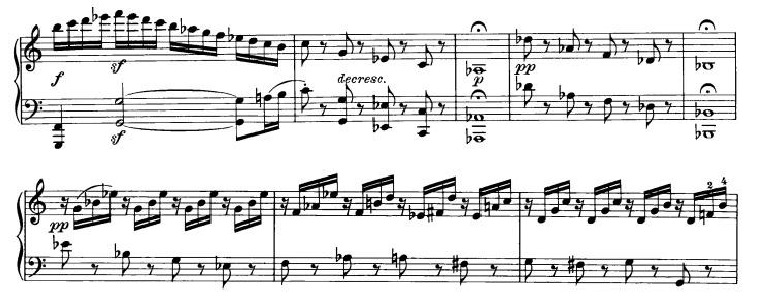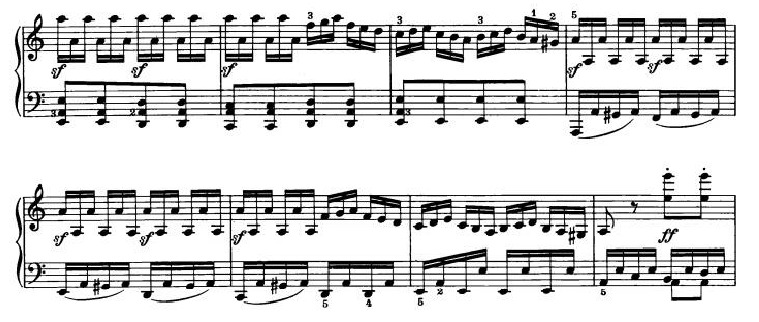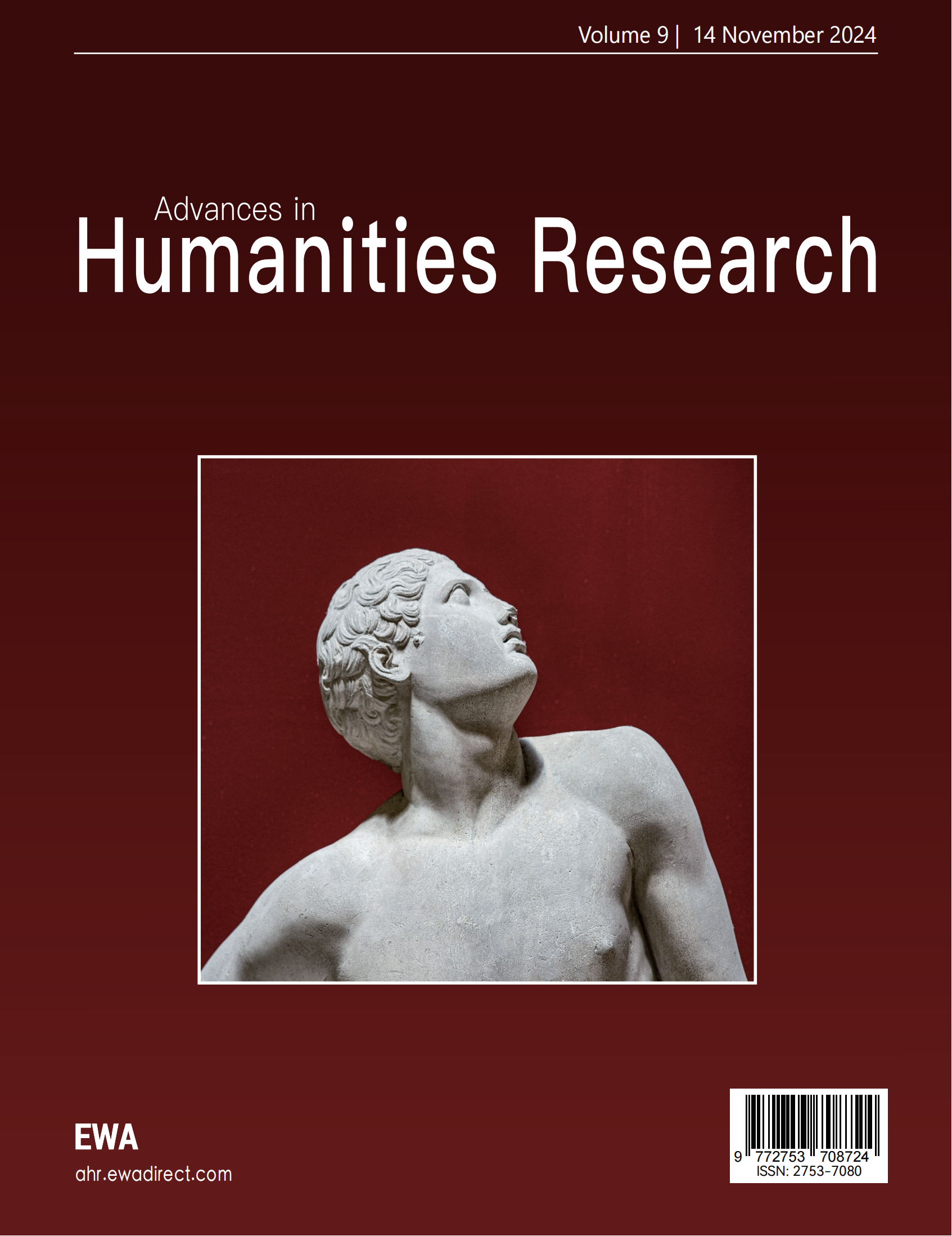1 Introduction and Background
1.1 Brief Introduction to Beethoven
Beethoven is one of the greatest musicians in history, having composed numerous works of profound meaning and rich content throughout his life. Statistics show that Beethoven’s extant works include 32 piano sonatas, 1 opera, 9 symphonies, and 1 oratorio. These compositions form a crucial part of world music history and have significantly influenced the development of modern music art. Beethoven’s music demonstrates exceptional artistic achievement, with a deep and rational emotional quality that became a focal point for the musical thought and political developments of his time. Piano sonatas hold a particularly important place in Beethoven’s creative journey; these works are notable for their expressive emotional range and thematic depth. As Beethoven’s musical artistry evolved, his compositions became structurally more refined and complete, with a grander and more profound musical style.
1.2 Background of the Composition
The piano sonata Dawn is one of Beethoven’s most representative works, reflecting his artistic mastery and creative thought. Initially titled Waldstein Sonata, Dawn was inspired by Beethoven’s personal life experiences. Composed in 1804 and dedicated to his friend, Count Waldstein, Beethoven had by this time been troubled by hearing loss for eight years. This condition not only hindered his daily communication with the outside world but also severely hampered his musical creativity. For a musician, losing the invaluable sense of hearing due to illness filled Beethoven with frustration and unease. To relieve these emotions, he often sought solace in nature, reflecting on the meaning of life amidst serene and stormy moments, the contrast of dawn and darkness, and the bustling city and quiet countryside. Nature gradually calmed him, providing an outlet for his inner anguish, and he eventually regained strength and rekindled his passion for musical creation. The piano sonata Dawn was born during this period, embodying hope through its musical style. The work features a radiant and optimistic musical theme, interspersed with somber and subdued sections that starkly contrast with the passionate main melody, thereby emphasizing the essence of the composition. This contrast also reflects Beethoven’s gradual shift in style from Classicism to Romanticism [1].
2 Analysis of the Musical Content of the Sonata Dawn
From a structural perspective, Beethoven’s piano sonata Dawn is divided into three parts. The first movement features a sonata form characterized by grandeur, solemnity, and passionate enthusiasm, serving as a concentrated embodiment of the sonata’s overall theme. In this movement, a single rhythmic pulse combines with rich and dynamic rhythms, imbuing the work with profound meaning. The second movement consists of only 28 measures, acting as a bridge between the first and third movements. In this section, Beethoven employs a beautiful slow tempo paired with novel and delightful content, gradually transitioning the melodic rhythm to the climactic third movement. The third movement adopts a pastoral rondo form and represents the climax of the entire piece. This movement is marked by vivid colors and a wide range of tonalities, featuring an expansive structure. The themes of enjoying nature and yearning for the future enrich the emotional depth of the music, allowing the overarching theme of the entire piece to be elevated [2].
2.1 Analysis of the First Movement
The first movement, consisting of 302 bars, is in C major and follows the sonata form. Its structure is divided into exposition, development, recapitulation, and coda. The exposition begins with a repeated chord progression in the bass, evoking morning birdsong outside a window. This is followed by a modulation in key, progressing from C major to G major, F major, c minor, and back to C major. Beethoven links the bars through techniques such as staccato, tremolo, and double-note runs, creating a naturally flowing rhythm. In the latter half of the exposition, a fresh melodic element contrasts with the first half through changes in tempo, rhythm, and emotion. The thematic emphasis is reinforced through repeated phrases and the progression from a dominant seventh chord to the tonic, smoothly transitioning into the development. The development section deeply explores the musical elements of the exposition’s theme, building to a climax through key modulations and enriched melodies. The recapitulation and coda revisit and conclude the thematic elements of the first movement, ending in a half cadence in C major. Furthermore, a toccata-like texture is employed to highlight the theme, bringing the movement to a close as the coda fades gradually.
2.2 Analysis of the Second Movement
The second movement of the Piano Sonata “Dawn” is composed in F major and follows a monophonic form, making it the shortest movement within the sonata, spanning only 28 bars. Initially, Beethoven intended this movement to feature an andante melody with extended passages. However, as a transitional piece, an overly elaborate second movement would disrupt the cohesion between the first and third movements. Consequently, Beethoven refined and condensed its content, resulting in the succinct form we see today. This movement serves mainly as a continuation of the previous movement’s theme and a prelude to the melody of the third. The tonal shifts are relatively simple, beginning in F major and, after minor modulations, returning to F major. By employing texture imitation techniques, an echo effect is achieved. In the concluding section, the theme is reiterated, with the tonality shifting back to C major, laying the groundwork for the third movement.
2.3 Analysis of the Third Movement
The third movement is the longest section of Beethoven’s piano sonata Dawn, consisting of 543 measures and set in C major, utilizing an ABACA rondo form. This movement expands and refines the themes from the first two movements, expressing the underlying emotional and intellectual content. The third movement can be divided into four parts: the theme, the first episode, the second episode, and the coda. Firstly, the theme section presents a pursuit of a beautiful life through a straightforward and exuberant melody, characterized by a passionate and bright tone. The expression of this section requires three interpretive techniques: the left hand plays in a higher register while the right hand gently provides the background music, creating a stylistic contrast in different tonal ranges; the second technique involves playing octaves with the right hand; the third technique uses the right hand’s first and second fingers to perform tremolos, accompanying the high notes. This diversity in timbre enriches the musical melody and reflects the gradually rising emotional tension within the piece. Next are the first and second episodes. The first episode features a distinct tarantella dance style, with the combination of octave and broken octave notes lending a solid and weighty feel to the melody, creating a lively and joyful atmosphere. The use of sixteenth-note triplets and a two-part folk melody in a minor key contributes to a smooth flow, further showcasing and deepening the theme. The first half of the second episode employs melodies in the parallel minor and c minor keys. The repeated melodic lines require the performer to alternate between hands, with variations in pitch and the broken chords in the bass enhancing the beauty of the melody. The music’s intensity gradually increases, transitioning toward the conclusion. Finally, the coda section employs sixteenth-note triplets to strengthen the tonal expressiveness. In this section, the first half emphasizes and repeats the thematic melody, characterized by a tense and urgent rhythm, while the second half modulates before returning to the original key, ultimately concluding the piece on the tonic [3].
3 Performance Analysis of the Sonata “Dawn”
3.1 Harmonic Treatment
Harmonic treatment is one of the distinctive features of Beethoven’s musical works. Unlike other composers, Beethoven’s works are filled with boldness and imagination, and the Sonata “Dawn” employs harmonic variations to enrich its structure. In the first movement, the harmony extends the main theme and introduces subtle variations to repeated sections, preventing them from feeling monotonous or dull. As shown in Example 1, the phrase at the end of measure 168 shifts from the original G to a lowered A-flat. The harmonic treatment sustains this alteration through measure 173, highlighting the importance of distinguishing tonal brightness and darkness during performance. The bright G note of the main theme contrasts with the slightly hesitant and struggling tone of the lowered A-flat following the harmonic modulation. When this distinction is effectively conveyed, the initial two bars of the expansion section propel this sense of hesitation forward, transforming into a lively and cheerful expression in the third bar as it blends back into the recapitulation.

Figure 1. Example 1 (168-176)
3.2 Dynamics Treatment
Dynamic treatment is a crucial and consistent element in musical compositions, and Beethoven’s Sonata “Dawn” incorporates numerous markings for sudden forte and piano contrasts.

Figure 2. Example 2 (73-75)
In Example 2, the fp and sf notations in measure 74 of the first movement, where the music suddenly softens after a strong note, alters the original flow of the music, adding dramatic flair. Such dynamic contrasts demand precise control over finger strength, as the disparity between forte and piano requires careful management of each keystroke’s speed and force. The sudden forte dynamics within the first two movements, set against a generally tranquil mood, create a sense of breaking the calm, pushing the music forward while forming a strong contrast with the previous mood. The progression of the entire piece necessitates a gradual crescendo, with performers required to manage the amplitude of intensity shifts, executing sudden fortes within the context of a broader crescendo [4].
3.3 Rhythmic Treatment
Rhythmic variation is essential for enhancing a piece’s overall effect. As a lengthy composition, Beethoven’s Sonata “Dawn” requires rhythm treatment to advance its musical structure. In Examples 4 and 5, measures 108 and 110 of the first movement showcase frequent rhythmic changes, where the accompaniment shifts from four sixteenth notes to triplets, and the melody-accompaniment rhythm moves from 1:1 and 1:2 to 2:3. These rhythm shifts introduce innovative development to the piece. In the third movement, from measures 79 to 86, the rhythmic changes alternate the melody-accompaniment pairing from 1:3 to 2:3, finally returning to 1:2. These close rhythm changes enrich the section’s musical effect, enhancing the live performance’s appeal and providing listeners with a captivating auditory experience. The performer’s ability to deliver a natural and smooth execution is key to realizing this effect [5].

Figure 3. Example 3 (108-110)

Figure 4. Example 4 (79-86)
3.4 Emotional Treatment
Among various musical instruments, the piano is universally recognized as the king of instruments. It not only possesses a wide range and powerful volume but also exhibits a rich and delicate tonal expressiveness, enabling it to convey profound and diverse emotional ideas during performances. As a piano sonata, Dawn has a unique advantage in reflecting natural scenery and expressing the creator’s thoughts and feelings. As a musician, one must deeply understand the compositional background and musical content when performing Dawn, integrating personal thoughts and emotions into the performance. From the perspective of emotional content, Dawn is filled with emotional contrasts. For example, the first movement is rich in emotion and strong expressiveness, characterized by a majestic, solemn, and sunny overall emotional style. However, Beethoven employs contrasting techniques to shape emotions; within the musical sections, there are depictions of the beautiful scenery of dawn alongside the darkness and profundity preceding it. The dramatic and contradictory interplay between these two images intensifies the audience’s emotional experience. As performers, it is crucial to grasp the differences in expressing these two emotional ideas, using variations in pitch, dynamics, and other techniques to convey emotional shifts [6]. Furthermore, in the recapitulation of the third movement, there are multiple repeated musical segments. The performer must pay attention to the subtle differences in the similar melodic and rhythmic repetitions, using progressively changing timbres and tones to illustrate the gradual intensification of emotions.
4 Conclusion
Beethoven’s piano sonata Dawn is a concentrated reflection of his insights and thoughts on life and his creative journey after experiencing poverty and illness. It showcases a high level of artistic accomplishment in both compositional techniques and forms, while also conveying rich emotional and ideological content. From the perspective of artistic creation, Dawn is a relatively unique piece within Beethoven’s body of work. Its musical language is simple and straightforward, with fresh and passionate emotions, allowing listeners to vividly experience beautiful imagery, such as the morning sunlight, the lively chirping of birds, and the gentle flow of mountain streams. It also embodies Beethoven’s spirit of confronting the setbacks of fate, finding solace and strength in nature, and aspiring to beauty within himself. Regarding the performance of Dawn, performers need to deepen their understanding of the piece’s content and flexibly employ various playing techniques, such as using harmonics instead of trills, decorating staccato melodies with continuous vibrato, alternating hands to create different scales, and adjusting dynamics and rhythm according to emotional changes. Building on this foundation, they should explore the expression of emotions within the music, using feelings as a guiding thread and melody as a medium to achieve a perfect rendition of Dawn both in melody and in a comprehensive interpretation of its emotional depth. The artistic merit of the piano sonata Dawn is not only reflected in its rich compositional techniques and embedded ideas but also in the uplifting emotional attitude it conveys to those facing adversity. Additionally, Beethoven’s diverse and innovative creative thought has guided the direction of modern musical art. The most significant meaning of music art research lies in the enlightening role that musical works play in the development of modern thought and civilization.
References
[1]. Yang, M. (2020). Analysis of Beethoven’s 21st Piano Sonata Dawn. Huanghe Zhi Sheng, (16), 90–91.
[2]. Cheng, J. L., & Liu, G. Y. (2019). Performance Techniques and Insights on Beethoven’s Dawn Sonata. Huanghe Zhi Sheng, (23), 39–43.
[3]. Ma, J. H. (2021). Exploring the Third Movement of Beethoven’s Sonata Dawn. Art Evaluation, (12), 57–60.
[4]. Zeng, Y. (2019). Analysis of Performance Techniques in Beethoven’s Piano Sonata Dawn Op. 53. Huanghe Zhi Sheng, (24), 37.
[5]. Jing, M. (2020). Learning Beethoven’s Dawn Sonata, Third Movement, Using the Comparative Analysis Method and Reflections. Northern Music, (02), 91–92.
[6]. Wang, C. F. (2021). Analysis and Comparison of Performance Versions of Beethoven’s Dawn Sonata. Huanghe Zhi Sheng, (07), 34–37.
Cite this article
Zhang,G.;Yang,M. (2024). Beethoven’s Piano Sonata “Dawn”: Musical Content and Performance Analysis. Advances in Humanities Research,9,59-63.
Data availability
The datasets used and/or analyzed during the current study will be available from the authors upon reasonable request.
Disclaimer/Publisher's Note
The statements, opinions and data contained in all publications are solely those of the individual author(s) and contributor(s) and not of EWA Publishing and/or the editor(s). EWA Publishing and/or the editor(s) disclaim responsibility for any injury to people or property resulting from any ideas, methods, instructions or products referred to in the content.
About volume
Journal:Advances in Humanities Research
© 2024 by the author(s). Licensee EWA Publishing, Oxford, UK. This article is an open access article distributed under the terms and
conditions of the Creative Commons Attribution (CC BY) license. Authors who
publish this series agree to the following terms:
1. Authors retain copyright and grant the series right of first publication with the work simultaneously licensed under a Creative Commons
Attribution License that allows others to share the work with an acknowledgment of the work's authorship and initial publication in this
series.
2. Authors are able to enter into separate, additional contractual arrangements for the non-exclusive distribution of the series's published
version of the work (e.g., post it to an institutional repository or publish it in a book), with an acknowledgment of its initial
publication in this series.
3. Authors are permitted and encouraged to post their work online (e.g., in institutional repositories or on their website) prior to and
during the submission process, as it can lead to productive exchanges, as well as earlier and greater citation of published work (See
Open access policy for details).
References
[1]. Yang, M. (2020). Analysis of Beethoven’s 21st Piano Sonata Dawn. Huanghe Zhi Sheng, (16), 90–91.
[2]. Cheng, J. L., & Liu, G. Y. (2019). Performance Techniques and Insights on Beethoven’s Dawn Sonata. Huanghe Zhi Sheng, (23), 39–43.
[3]. Ma, J. H. (2021). Exploring the Third Movement of Beethoven’s Sonata Dawn. Art Evaluation, (12), 57–60.
[4]. Zeng, Y. (2019). Analysis of Performance Techniques in Beethoven’s Piano Sonata Dawn Op. 53. Huanghe Zhi Sheng, (24), 37.
[5]. Jing, M. (2020). Learning Beethoven’s Dawn Sonata, Third Movement, Using the Comparative Analysis Method and Reflections. Northern Music, (02), 91–92.
[6]. Wang, C. F. (2021). Analysis and Comparison of Performance Versions of Beethoven’s Dawn Sonata. Huanghe Zhi Sheng, (07), 34–37.









